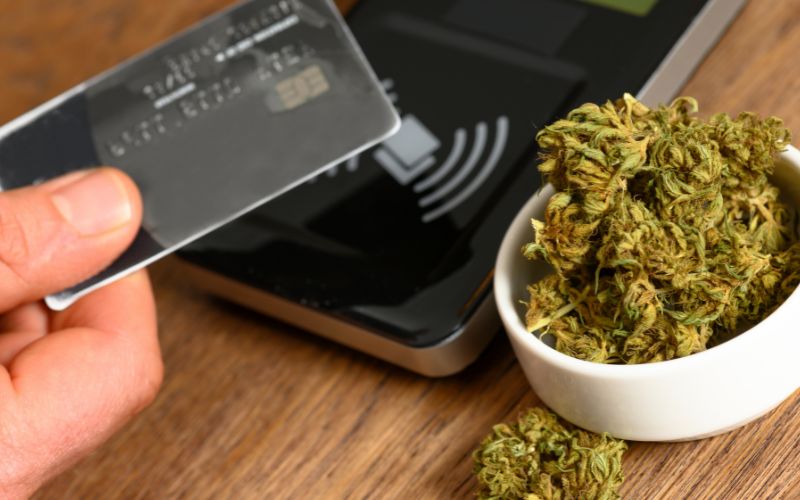The cannabis industry has witnessed significant growth over the past few years, with a notable rise in online sales of hemp-derived products. This article explores the reasons behind cannabis dispensaries’ resistance to this trend.
Understanding Cannabis and Hemp
Definition and Differences
Cannabis and hemp are often confused but have distinct legal and chemical compositions. Understanding these differences is crucial in discussing the industry. Cannabis and hemp are both varieties of the Cannabis sativa plant, but they have significant differences in terms of their chemical compositions and legal status. The main difference between the two is the level of tetrahydrocannabinol (THC) they contain.
THC is the psychoactive component of cannabis that produces a “high” when consumed. In cannabis, THC levels can range from 5-30% or even higher, depending on the strain. Hemp, on the other hand, contains very low levels of THC, typically below 0.3%.
In addition to THC, both cannabis and hemp contain cannabidiol (CBD), which is non-psychoactive and has a variety of potential therapeutic benefits. However, the levels of CBD in hemp are typically higher than in cannabis.

Legal Landscape
From a legal perspective, cannabis and hemp are also treated differently. In many countries, including the United States, cannabis is still federally illegal and is classified as a Schedule I controlled substance. However, many states have legalized cannabis for medical and/or recreational use. Hemp, on the other hand, was legalized on a federal level in the United States with the passage of the 2018 Farm Bill, which removed it from the list of controlled substances and allowed for the widespread cultivation and commercialization of hemp and hemp-derived products.
Understanding these differences is important for anyone involved in the cannabis industry, whether as a producer, retailer, or consumer. It’s important to know the legal regulations and chemical compositions of cannabis and hemp in order to ensure compliance and to make informed decisions about products.
The Growth of Online Sales
Trends in E-commerce for Hemp Products & Consumer Behavior Shift
E-commerce has revolutionized how consumers access hemp products, leading to a surge in online sales. The shift towards online shopping has been accelerated by factors like convenience and the COVID-19 pandemic. Consumers can now easily browse and purchase a wide variety of hemp products such as CBD oil, hemp seeds, hemp clothing, and more from the comfort of their own homes. This convenience has contributed to the significant increase in online sales of hemp products in recent years.
The COVID-19 pandemic has also played a major role in the growth of e-commerce for hemp products. With people staying at home and avoiding crowded places, online shopping has become the preferred method for purchasing goods, including hemp products. Additionally, the pandemic has raised awareness about the health and wellness benefits of hemp products, leading to increased demand and sales.
Furthermore, the accessibility of information and reviews online has made it easier for consumers to research and learn about different hemp products before making a purchase. This transparency has helped build trust in the quality and benefits of hemp products, further driving online sales.
In conclusion, e-commerce has transformed the way consumers shop for hemp products by providing convenience, accessibility, and a wide range of options. The shift towards online shopping has been accelerated by the COVID-19 pandemic and is likely to continue to shape the future of the hemp industry.
Cannabis Dispensaries: A Quick Overview
What are Cannabis Dispensaries?
Dispensaries are storefronts where consumers can purchase legal cannabis and related products.
What Services and Products do Dispensaries Offer?
Here is a list of the different services and products a cannabis dispensary might offer to their customers.
1. Cannabis flower
2. Cannabis concentrates (e.g. wax, shatter, THC oil)
3. Edibles (e.g. gummies, chocolates, baked goods)
4. Vaporizers and smoking accessories
5. Topical products (e.g. lotions, balms, patches)
6. Tinctures and sublingual oils
7. Pre-rolled joints and blunts
8. CBD products
9. Cannabis accessories (e.g. grinders, rolling papers, pipes)
10. Cannabis-infused beverages
11. Accessories for consumption (e.g. pipes, bongs, dab rigs)
12. Cannabis merchandise (e.g. clothing, accessories)
13. Educational resources on cannabis use and
properties.
14. Home cultivation equipment and supplies
15. Cannabis delivery services (where legal)
Challenges Faced by Dispensaries
Dispensaries navigate complex legal and regulatory frameworks that vary by region. The competitive landscape includes challenges from both physical and online retailers.
The Stance of Dispensaries on Hemp-Derived Online Sales
Cannabis dispensaries initially viewed online hemp sales skeptically, concerned about various aspects impacting their business such as quality control, regulation, and economic implications.

Quality Concerns
Dispensaries pride themselves on providing high-quality products, a standard hard to maintain with online sales. Physical stores implement stringent quality control measures to ensure customer satisfaction and safety. Some of the quality control measures implemented at dispensaries include:
1. Product Testing: Dispensaries test their products for potency, purity, and contaminants such as pesticides, heavy metals, and mold. This ensures that customers are getting safe and effective products.
2. Proper Storage: Proper storage of cannabis products is crucial for maintaining their quality and potency. Dispensaries store their products in controlled environments to prevent degradation.
3. Picking the Best From the Best: Dispensaries carefully select the products they sell, choosing from reputable and trusted suppliers to ensure a high standard of quality.
4. Knowledgeable Staff: Dispensaries invest in training their staff to be knowledgeable about the products they sell and to provide valuable guidance to customers.
5. Compliance with Regulations: Dispensaries adhere to strict regulations set by government authorities to ensure that their products meet safety and quality standards.
By implementing these measures, dispensaries can maintain the high-quality standards they pride themselves on, even with the challenges of online sales.
Regulatory Compliance
Adhering to regulations is a cornerstone of dispensary operations, ensuring legitimacy and consumer trust. Regulating online sales poses unique challenges, particularly in ensuring compliance across various jurisdictions. One challenge is the diverse regulatory landscape across different regions. Each jurisdiction may have different rules and requirements regarding online sales of cannabis products, such as age verification, packaging and labeling, and delivery restrictions. Dispensaries that operate in multiple jurisdictions must navigate these differences and adapt their online sales processes accordingly to remain compliant.
Another challenge is the verification of customer legitimacy and age, especially in the online environment. Dispensaries must implement robust age verification procedures and ensure that only qualified and authorized individuals can make online purchases. This may involve using specialized age verification services or integrating age verification processes within the online sales platform.
Additionally, dispensaries must ensure that their online sales operations adhere to all relevant privacy laws and regulations, particularly when it comes to storing and handling customer data. This includes implementing robust data security measures to protect sensitive customer information from data breaches or unauthorized access.
To navigate these challenges, dispensaries often invest in compliance management systems and work closely with legal and regulatory experts to ensure that their online sales operations are fully compliant with all relevant laws and regulations. By doing so, dispensaries can build and maintain consumer trust and confidence in the legitimacy and integrity of their online sales operations.
Economic Implications
The rise of online hemp sales can negatively impact local dispensaries and the communities they serve. Taxation and revenue generation from cannabis sales are significant considerations for both businesses and governments.
How Online Sales Affect Physical Dispensaries
Online retailers often offer lower prices and wider selections, posing a threat to traditional dispensaries. The competition between online and physical stores is fierce, with each trying to capture a significant market share.
Consumer Safety and Education
Dispensaries often serve as educational hubs for consumers, offering advice and information about products. Online purchases lack the personal interaction and assurance that dispensaries provide, raising safety concerns. Additionally, without the guidance of a trained professional, consumers may not understand the proper dosage, usage, and potential side effects of the products they are purchasing. This lack of education and guidance can potentially lead to misuse and adverse health effects.

Furthermore, online purchases may raise concerns about the quality and authenticity of the products being sold. Without the ability to physically inspect and verify the products, consumers may be at risk of purchasing counterfeit or low-quality items.
By eliminating the educational aspect and personal interaction provided by dispensaries, online purchases may compromise the overall safety and well-being of consumers. It is important for consumers to consider the potential risks and drawbacks of purchasing cannabis products online, and to prioritize their health and safety when making purchasing decisions.
The Future of Cannabis Sales
The cannabis industry is evolving, with potential changes in legal frameworks and consumer preferences. There is potential for collaboration between online and physical sales channels to better serve consumers. This collaboration could allow consumers to research and compare products online, make purchases, and then pick up their orders at a physical location. This hybrid model could provide convenience for consumers while also maintaining the face-to-face interaction that many value.
Furthermore, with the potential changes in legal frameworks, the cannabis industry may see more mainstream acceptance and integration into traditional retail settings. This could lead to partnerships between cannabis companies and established retailers, creating new opportunities for reaching a wider customer base.
With consumer preferences shifting towards a more personalized and curated shopping experience, the cannabis industry may also see an increase in niche and specialty stores catering to specific demographics or product preferences. This could lead to a more diverse and tailored product offering for consumers.
Overall, the evolving cannabis industry presents a range of opportunities for collaboration and innovation, and businesses should be prepared to adapt to meet the changing needs and preferences of consumers.
Balancing Online and Physical Sales
The industry is exploring ways to balance the benefits of online and physical sales. Innovative business models and partnerships could offer solutions to the challenges faced by dispensaries. One potential solution is the implementation of “click-and-collect” services, where customers can browse and purchase products online and then pick them up at a physical location. This allows for the convenience of online shopping while still providing an in-person experience and the opportunity for dispensaries to build relationships with customers.
Additionally, partnerships with delivery services could allow dispensaries to offer the convenience of online delivery while still maintaining a physical presence. By working with reliable delivery partners, dispensaries can ensure that their products reach customers in a timely and professional manner.
Furthermore, some dispensaries are exploring the idea of offering virtual consultations and education sessions, allowing customers to learn about products and receive personalized recommendations from the comfort of their own homes.
Overall, finding a balance between online and physical sales is crucial for the success of dispensaries in today’s market. By embracing innovative business models and partnerships, dispensaries can adapt to the changing landscape and continue to thrive in the industry.
Conclusion
This article has explored the various factors contributing to cannabis dispensaries’ opposition to hemp-derived online sales. While challenges exist, the future of the industry lies in finding a balance that benefits both consumers and businesses.
FAQs
- Why are dispensaries concerned about online sales? Dispensaries have several concerns about online sales. Firstly, there’s the issue of quality control. When customers buy from dispensaries directly, they can ensure the products meet high standards, something harder to guarantee with online sales. Secondly, dispensaries are worried about regulatory compliance. Selling cannabis products online can be a legal minefield, varying greatly by region. Finally, there’s the economic impact. Online sales could potentially reduce foot traffic to physical stores, impacting local businesses and communities.
- How do online sales impact the quality of hemp products? Online sales can make it challenging to maintain consistent quality. When buying in person, customers can see, smell, and sometimes even sample products before purchasing. This hands-on approach ensures a level of quality that’s difficult to replicate online. Plus, dispensaries typically have knowledgeable staff to guide customers, which is missing in the online buying experience. So, while online platforms can offer convenience, they often lack the quality assurance that comes with in-person purchases.
- What role do dispensaries play in consumer education? Dispensaries play a crucial role in educating consumers. They’re not just places to buy cannabis; they’re also learning centers. Staff at dispensaries are often well-versed in their products, able to offer advice on dosages, effects, and safe consumption practices. This kind of personalized education is especially important for new users or those exploring medical cannabis. It’s a level of service that’s hard to replicate online, where information can be overwhelming or not tailored to individual needs.
- Are there potential benefits to dispensaries from online sales? Absolutely, there are potential benefits. For one, online sales can help dispensaries reach a wider customer base, including those who can’t visit in person. It’s also a great way to offer convenience to regular customers, like through online ordering for in-store pickup. Moreover, having an online presence can be a powerful marketing tool, helping dispensaries to build their brand and educate potential customers about their products and services.
- How might the legal landscape affect the future of cannabis sales? The legal landscape is a big factor in shaping the future of cannabis sales. As laws and regulations evolve, they can open up new opportunities for both online and offline sales. For instance, easing restrictions could allow for more interstate commerce, expanding the market for online sales. On the flip side, stricter regulations might impose more controls on how cannabis is sold online. It’s a dynamic environment, and dispensaries need to stay nimble and informed to navigate these changes successfully.

